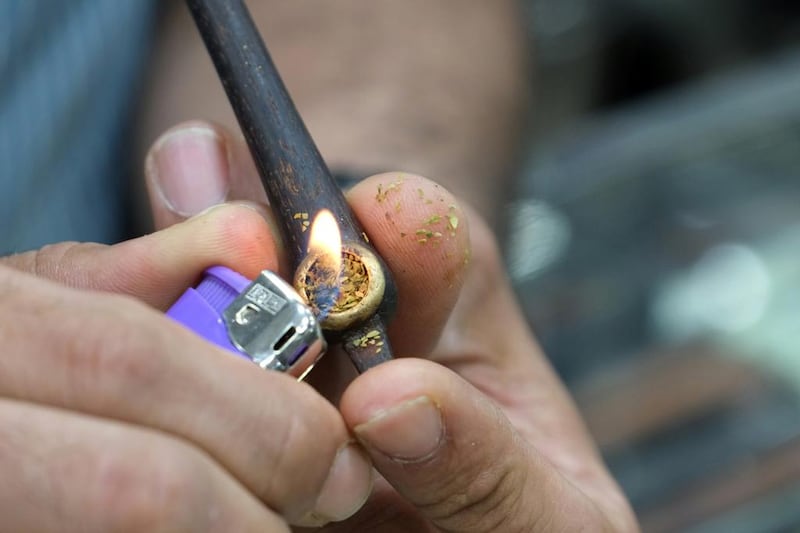Only one in four smokers who took part in an online survey said the UAE’s tobacco tax had changed their cigarette habit.
The latest figures into smoking habits in the UAE offer the first indicator of the impact of government measures introduced in October to encourage more people to quit.
Of the 600 participants of an Apester poll conducted by The National, 75 per cent said the 100 per cent 'sin tax' on tobacco products had not led them to quit since prices were increased in the final quarter of last year.
Another trend picked up in the results was medwakh’s increasing popularity.
The super-strength pipe-smoked tobacco was smoked by 57 per cent of those who took part in the survey, with almost one in five people smoking it every day.
More than half of smokers said they had tried e-cigarettes or e-pipes for a nicotine hit, despite devices and refills being banned from sale in the UAE.
Of those who had tried alternatives to conventional cigarettes, 54 per cent said they were not prepared to switch to electronic devices to feed their habit.
“Smoking can affect any age group, but most of the patients we come across belong to the middle-aged group,” said Dr Noordin Wadhvaniya, a pulmonologist at Specialist Respiratory Medicine, Canadian Specialist Hospital.
“Tobacco smoke damages most of the body’s organs, due to the presence of many chemical substances in the smoke. Low quality tobacco can have a more adverse effect.”
The Tobacco Atlas report, released this month, revealed fewer men in the UAE smoke than elsewhere in the GCC, at 14 per cent of the male population compared with more than a quarter of men in Saudi Arabia, and almost half of those in Bahrain.
Less than 2 per cent of UAE women admitted to smoking in the report.
A study by Tanta University in Egypt found lung cancer is the most common cancer among Emirati men, with about 30,000 people forecast to be diagnosed each year by 2030 across the Middle East.
The 2017 Lung Cancer Incidence in the Arab League Countries report predicts there will be 29,576 new cases in 2020, up from 16,596 in 2008.
Dr Wadhvaniya said smokers hoping to give up should avoid alcohol and other triggers, and discuss nicotine replacement therapy with a doctor.
_________________
Read more:
Doctors call for 'minimum pricing' plan for tobacco after introduction of UAE's sin tax
Almost 3,000 smoking-related deaths a year in UAE, report shows
More enforcement needed to curb smoking in UAE, say experts
___________________
Doctors are seeing younger patients with smoking-related lung conditions.
“I used to see patients over-45, but recently I’m treating more patients who are just 30 who have come to the clinic with lung symptoms related to smoking,” said Dr Saheer Sainalabdeen, a specialist pulmonologist at International Modern Hospital in Dubai.
“Smoking is a disease more than an addiction. Like obesity, it is driven by multiple behavioural factors.
“There is no safe cigarette, it is like poison. Medwakh is the second-most common form of smoking in my patients after cigarettes, especially in young people.
“There is a misconception that medwakh is less harmful, but it has different carcinogenic elements.
“When you smoke it, large amounts of nicotine immediately enter the blood affecting the central nervous system and heart.
“It causes increased blood pressure, heart rate and has been related to seizures. It is highly addictive and quitting is really difficult.”
Of those who completed The National's survey, 7 per cent began smoking before they were 13, while 16 per cent were under 16 when they started cigarettes.
“Most health issues related to smoking would start around their forties or fifties, as lung function usually deteriorates with age but in smokers it deteriorates faster,” said Dr Arun Arya, a pulmonary disease consultant at NMC Royal hospital.
Smoking tobacco causes more than 85 per cent of cancer cases, 22 per cent of global cancer deaths and 71 per cent of global lung cancer deaths.
According to the World Health Organisation, 16.4 per cent of cancer deaths are attributed to cancer of the trachea, bronchus or lung.
"One hit of medwakh is the equivalent of smoking four or five cigarettes, and some of these young guys will smoke 20-30 times a day – equal to about five packets of cigarettes a day," said Dr Sainalabdeen.
“It is important to stop people from smoking at an early age before they develop an addiction that will be with them for a very long time,” Dr Zaid Zoumot, consultant pulmonologist at the Respiratory and Critical Care Institute at Cleveland Clinic, Abu Dhabi.
“In this region, a lot of people smoke medwakh and that is very hard to control.
“Smokers do not really know what they are smoking as it is not standardised and the quality can vary greatly.
“Awareness and education for younger people is very important. Medwakh is a potentially a big problem.”






